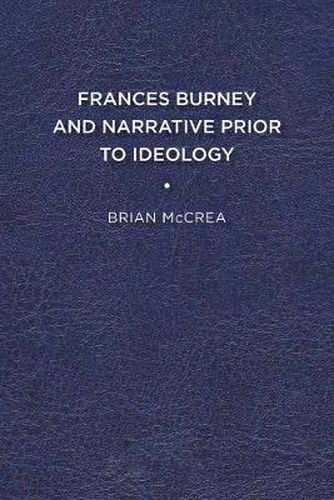Readings Newsletter
Become a Readings Member to make your shopping experience even easier.
Sign in or sign up for free!
You’re not far away from qualifying for FREE standard shipping within Australia
You’ve qualified for FREE standard shipping within Australia
The cart is loading…






This title is printed to order. This book may have been self-published. If so, we cannot guarantee the quality of the content. In the main most books will have gone through the editing process however some may not. We therefore suggest that you be aware of this before ordering this book. If in doubt check either the author or publisher’s details as we are unable to accept any returns unless they are faulty. Please contact us if you have any questions.
Frances Burney and Narrative Prior to Ideology works between Burney’s Journals and Letters and her fiction more thoroughly than any study of her in the past twenty-five years. By doing so, it offers significant reinterpretations of Burney’s four novels: Evelina, Cecilia, Camilla, and The Wanderer. It describes Burney’s eluding the major modern-isms through which critics have tried to read her: Feminism (with its gendering of beauty and reversal of gender roles); Capitalism and its Marxist critique (here the details of Burney’s housekeeping become important); Professionalism (as a response to status inconsistency and class conflict); and Ian Watt’s Formal Realism (Burney perhaps saved the novel from a sharp decline it suffered in the 1770s, even as she tried to distance herself from the genre).
Burney’s most successful writing appeared before the coining of ideology . But her standing prior to ideology is not a matter of chronological accident. Rather, she quietly but forcefully resisted shared explanations-domesticity as model for household management, debt as basis for family finance, professional status as a means to social confidence, the novel as the dominant literary genre-that became popular during her long and eventful life.
Frederic Jameson has described Paul de Man, in private conversation, claiming, Marxism … has no way of understanding the eighteenth century. Frances Burney and Narrative Prior to Ideology conjoins Burney’s eighteenth-centuryness with her modernity.
$9.00 standard shipping within Australia
FREE standard shipping within Australia for orders over $100.00
Express & International shipping calculated at checkout
Stock availability can be subject to change without notice. We recommend calling the shop or contacting our online team to check availability of low stock items. Please see our Shopping Online page for more details.
This title is printed to order. This book may have been self-published. If so, we cannot guarantee the quality of the content. In the main most books will have gone through the editing process however some may not. We therefore suggest that you be aware of this before ordering this book. If in doubt check either the author or publisher’s details as we are unable to accept any returns unless they are faulty. Please contact us if you have any questions.
Frances Burney and Narrative Prior to Ideology works between Burney’s Journals and Letters and her fiction more thoroughly than any study of her in the past twenty-five years. By doing so, it offers significant reinterpretations of Burney’s four novels: Evelina, Cecilia, Camilla, and The Wanderer. It describes Burney’s eluding the major modern-isms through which critics have tried to read her: Feminism (with its gendering of beauty and reversal of gender roles); Capitalism and its Marxist critique (here the details of Burney’s housekeeping become important); Professionalism (as a response to status inconsistency and class conflict); and Ian Watt’s Formal Realism (Burney perhaps saved the novel from a sharp decline it suffered in the 1770s, even as she tried to distance herself from the genre).
Burney’s most successful writing appeared before the coining of ideology . But her standing prior to ideology is not a matter of chronological accident. Rather, she quietly but forcefully resisted shared explanations-domesticity as model for household management, debt as basis for family finance, professional status as a means to social confidence, the novel as the dominant literary genre-that became popular during her long and eventful life.
Frederic Jameson has described Paul de Man, in private conversation, claiming, Marxism … has no way of understanding the eighteenth century. Frances Burney and Narrative Prior to Ideology conjoins Burney’s eighteenth-centuryness with her modernity.